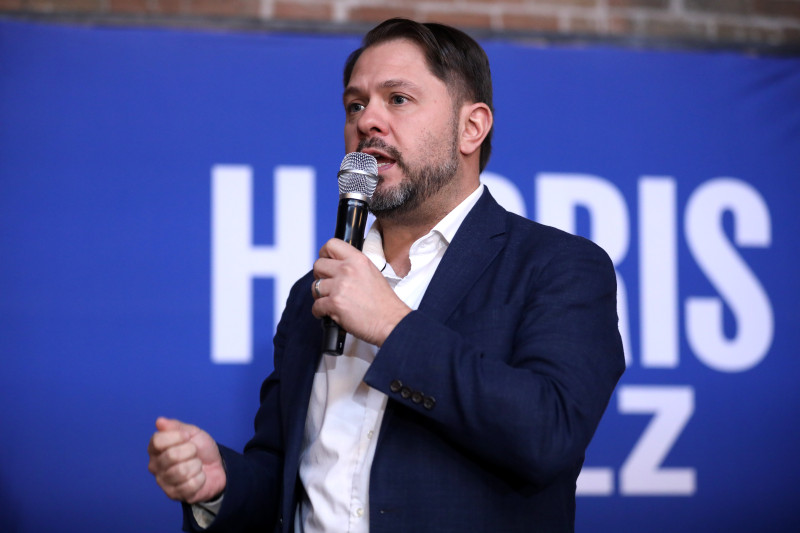In Arizona’s Senate Race, Both Candidates Have Plans to Address Drought. But Only One Acknowledges Climate Change’s Role
In the span of an hour, climate change and its impacts on Arizona got less than three minutes of attention at the tail end of the debate last month between Democratic Rep. Ruben Gallego and Republican Kari Lake, who are locked in a tight race to be the state’s next senator.
The impacts of global warming on the people and environment of Arizona have been on full display in recent years, with the state seeing record-breaking hot summers and continued drought, but in the swing state that could decide which party controls the Senate as well as who becomes the next U.S. president, it’s getting little attention from the candidates.
Of the other issues that took up the bulk of the debate, Arizona’s position as a border state led the discussions to focus on immigration. But immigration is, at its root, about water policy, said Rhett Larson, a water law professor at Arizona State University.
“If you think that immigration is the most important issue right now, let me tell you something: If you look at the patterns of human migration around the world, it’s people fleeing water-insecure regions to get to water-secure regions,” he said. “People are doing what they’ve done for 10,000 years. They’re following the water.”
Explore the latest news about what’s at stake for the climate during this election season.
The same tie to water is found in inflation, Larson said, with drought and rising water costs affecting food and housing expenses, especially in Arizona. And global conflicts are often exacerbated by increasing aridity and other impacts of climate change.
In recent years, extreme heat and drought have become synonymous with Arizona. This summer was the hottest on record in Phoenix, the country’s fifth-largest city, where residents experienced 113 days straight of temperatures above 100 degrees Fahrenheit, also a record. The surging summertime temperatures have killed hundreds in recent years, with 466 confirmed deaths so far this year.
Drought is also increasing. Flows on the state’s major rivers are declining, and levels in groundwater aquifers are dropping, driven by both climate change and overconsumption of the vital resource to sustain Arizona’s abundant agricultural operations. That’s led wells to run dry and left communities struggling to find water for their residents.
Those fights over water are raging in what is yet again a key battleground state in this month’s election. In recent years, the once consistently Republican state has become increasingly blue—with implications for both the country and the world.
If Democrats can keep the Senate, it would have major implications for passing legislation to address climate change. If the party loses both the White House and the Senate, it could allow Republicans to reverse the Biden administration’s climate wins, such as the hundreds of billions of dollars in clean energy tax credits delivered by the Inflation Reduction Act, which former President Donald Trump has vowed to repeal if he’s elected.
Gallego has consistently polled ahead of Lake, though Trump has maintained a slight lead over Vice President Kamala Harris heading into Election Day on Nov. 5.
Climate Not a Top Issue
Despite the clear impact climate change is having on the state, it’s not a primary issue for most voters, said Ed Beshore, a co-leader of the Citizens’ Climate Lobby’s Tucson chapter. Most voters are worried about “pocketbook issues” like the economy, and so the chapter’s grassroots work has revolved around telling people how climate issues impact their finances, such as with residential electric and water bills or the cost of housing.
“Climate change makes a lot of issues worse,” Beshore said.
Gallego, a U.S. Marine Corps veteran who currently represents Arizona’s 3rd Congressional District in the U.S. House of Representatives, has called attention to the impacts of climate change on Arizonans.
“We have to first accept that climate change is happening” before the state can properly address the issues it brings, like drought and the changing power grid, Gallego said during the Oct. 9 debate. He emphasized the need for more water conservation and pushed for more nuclear power to meet the state’s energy needs.

Lake, a former news anchor who continues to deny her defeat in the 2022 Arizona governor’s race, has frequently cast doubt on climate change over the years. When the two candidates were asked at the debate how they would deal with Arizona’s energy and water demands in the face of a changing climate, Lake echoed the sentiment now synonymous with Trump’s energy strategy.
“Drill, baby, drill,” she responded, referring to the Republican Party’s plan to further increase oil and gas production in the U.S. as a way to maintain the energy supply, despite that those fuels drive climate change and Arizona produces little of them.
Neither candidate responded to requests for comment from Inside Climate News.
Increasingly, Arizonans, especially young voters, recognize the need for climate action. Gallego’s work to address the impacts of global warming has been key for environmental groups.
“Not only does Ruben Gallego acknowledge that climate change is an issue, but he supports actions to address it, and has voted for climate action,” said Sandy Bahr, director of the Sierra Club’s Grand Canyon Chapter, which has endorsed Gallego. “Sometimes people talk about change, but you know, he has a voting record that shows that he supports action on climate change.”
Different Strategies for Dealing with Drought
There is one environmental issue that both candidates have plans for, even if they don’t agree on what’s causing it: drought.
To address shortages on the Colorado River, a major source of Arizona’s water, the federal government’s response so far has largely focused on paying water users to take less. Gallego has proposed legislation to tax businesses producing water-intensive crops and stop foreign companies from moving into the state to use its water, an issue that’s gotten intense scrutiny in recent years.
Lake has argued that conservation, especially paying farmers not to farm, is unsustainable. Instead, she said, the focus needs to be on finding new sources of water.
“We can’t conserve our way out of this crisis. Otherwise, we’ll end up giving the short end of the stick to our ag community and our ranchers, and we’ll have a food crisis before we have a water crisis,” she said. “I want to go to Washington, D.C., and work on true solutions, piping in fresh water, desalination, but finally, for once and for all, bringing in new sources of water to the West.”

Larson, the ASU water law professor, has reservations about both candidates’ plans. Gallego has a history of working on water policy, which is a plus, but some of his plans would pass on the costs to consumers. There’s a reason water-intensive crops like alfalfa, used to feed cattle, are grown in Arizona: the state’s abundant sunshine and temperate climate allow for multiple harvests, unlike many other states.
As for Lake, it’s true conservation may not be enough to address the problem, Larson said, but plans like piping in freshwater from desalination plants or elsewhere would be incredibly expensive and challenging to get permitted, both due to environmental regulations and property rights.
But the key difference in their treatment of the state’s increasing aridity is how they talk about climate change.
“Everyone who works in water knows that climate change is real, human beings contribute to it significantly and it’s a major challenge for our water supply,” Larson said. “Anybody who says otherwise just doesn’t understand the problem.”
Addressing drought in Arizona and the West means accepting that fact, he said. Years of overuse, combined with climate change, have left the Colorado River in steep decline. The river’s flows diminished roughly 20 percent over the past two decades. The federal Bureau of Reclamation has reduced water allocations in recent years, paying users to conserve water. And the seven Colorado River Basin states, area tribes and the federal government are in negotiations to cut even more. Meanwhile, cities and states are scrambling to find new water supplies.
Congress will be key, as it already has been, to funding further conservation measures and innovations needed to address the shortages.
“The choice to live in the desert is the choice to prioritize water policy because in the desert, it doesn’t matter what other policy you get right if you get water policy wrong,” Larson said. “You can have the best education system and the best tax system, but if you botch water policy, none of it will matter.”
About This Story
Perhaps you noticed: This story, like all the news we publish, is free to read. That’s because Inside Climate News is a 501c3 nonprofit organization. We do not charge a subscription fee, lock our news behind a paywall, or clutter our website with ads. We make our news on climate and the environment freely available to you and anyone who wants it.
That’s not all. We also share our news for free with scores of other media organizations around the country. Many of them can’t afford to do environmental journalism of their own. We’ve built bureaus from coast to coast to report local stories, collaborate with local newsrooms and co-publish articles so that this vital work is shared as widely as possible.
Two of us launched ICN in 2007. Six years later we earned a Pulitzer Prize for National Reporting, and now we run the oldest and largest dedicated climate newsroom in the nation. We tell the story in all its complexity. We hold polluters accountable. We expose environmental injustice. We debunk misinformation. We scrutinize solutions and inspire action.
Donations from readers like you fund every aspect of what we do. If you don’t already, will you support our ongoing work, our reporting on the biggest crisis facing our planet, and help us reach even more readers in more places?
Please take a moment to make a tax-deductible donation. Every one of them makes a difference.
Thank you,
David Sassoon
Founder and Publisher
Vernon Loeb
Executive Editor
Share this article
- Republish
Disclaimer: The copyright of this article belongs to the original author. Reposting this article is solely for the purpose of information dissemination and does not constitute any investment advice. If there is any infringement, please contact us immediately. We will make corrections or deletions as necessary. Thank you.








